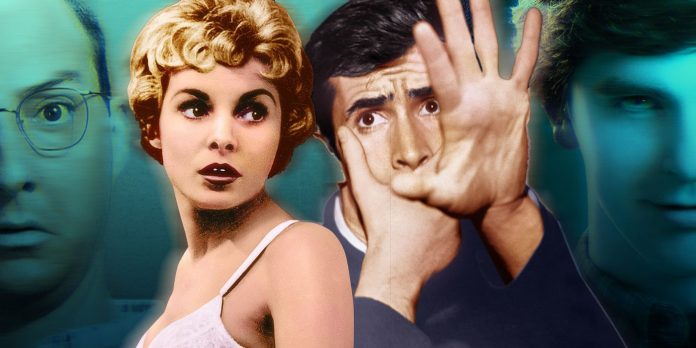With the help of Norman Bates and his mother, Alfred Hitchcock’s Psycho popularized and revolutionized a nefarious trope used in television and film.
Thanks to Alfred Hitchcock’s signature magic of filmmaking, Psycho is one of the most iconic films in cinema history. He adapted the film from Robert Bloch’s 1959 novel of the same name, in which the author Norman Bates conjured up Mother and the Motel. Although the story follows Marion Crane and the investigation into her subsequent murder, Norman’s strange relationship with his mother is in the spotlight. While psycho certainly isn’t the first to exhibit a twisted mother-son relationship, it is largely responsible for popularizing the trops in entertainment.
Norman’s relationship with his mother is toxic. As a child, his mother, Norma, brainwashed him into believing sex was a sin, and all women – except her – were “whores” who wanted to corrupt him. Even so, Norman and Norma live alone together and are very close until she meets her fiancé Joe Considine. It’s Joe who convinces Norma to buy the motel. Jealous of his mother’s preoccupation with her new lover, Norman kills them both with poison. Consumed by guilt, Norman’s personality splits. He exhumed his mother’s body and kept it in the house. There he commutes back and forth between Norman, the shy motel manager, and mother, the murderess of all women to whom Norman is attracted.
Keep scrolling to read on
Click the button below to start this article in quick view.
It’s a character dynamic for psychology textbooks, and one that Norman – and first-time viewers – won’t know until after Psycho’s climax is revealed. While Norman and Norma’s relationship is abusive and downright disturbing, it is nonetheless fascinating. A & E’s prequel series Bates Motel further expands the relationship and transports audiences back to a time when the infamous Norma is still alive. The show manages to make Norman and Norma’s “strange” relationship even stranger, with the two even sharing a sustained kiss. As Bates Motel holds onto Psycho’s spirit, it intensifies the horror and pushes the mother-son relationship further into the realm of taboos.
While the sexual aspect was primarily pushed aside – and for good reason – Psycho’s antagonists laid the groundwork for the twisted mother and son relationship in conversation. Norman’s arrogant, cruel manner, combined with Norman’s obsession with answering her anyway, makes for a good comedy.
Arrested Development’s Lucille Bluth and her son Buster make good use of this dynamic. Lucille and Buster often raise eyebrows with their unusual bond. Like Norman, he only addresses her as a mother and, despite her cruelty, quickly comes to her defense. On the other hand, Lucille is jealous of his romantic relationships. Most of the time, their relationship is more like a married couple than a mother / son. The result is a harrowing exhilaration that is purposely intended to make viewers uncomfortable.
Animation jumped into the action too. The Simpsons Skinner and mother Agnes are essentially comic book versions of Norman and Norma, with the show making multiple references to Psycho. Stan Smith and his mother Betty model a similar relationship in American Dad! While Betty isn’t cruel, she knows how to manipulate Stan. As such, Stan is deeply jealous of her many friends – whom he kidnaps and drops on a remote island – and frequently calls his mother “beautiful” and “sexy,” much to his wife’s disgust.
Unabashedly inspired by psycho, the shows shed light on the relationship and choose to play elements of it for laughter, even if it stays awful. However, other properties lean more towards the inherent darkness and trauma. In Boardwalk Empire, Jimmy Darmody’s not-so-subtle oedipal relationship with his mother leads to a controversial incestual plot. And the latest villain from Fear the Walking Dead admits he murdered his mother because she thought he was “disturbed” even though he continues to talk to her after death – much like Norman.
While Boardwalk Empire and Fear the Walking Dead haven’t confirmed that they were inspired by the Bates family, the memorable nature of Psycho makes it hard not to think of Norman and Norma. In a sense, Psycho modernized the Greek tragedy Oedipus Rex by highlighting a nefarious subject through a fictional horror lens. Hitchcock worked his magic, delivering shock, disgust, and fascination in equal parts. As such, the legacy of film extends far and wide. Coupled with the terror-provoking shower scene, Norman and Norma’s relationship almost single-handedly popularized and revolutionized the twisted mother-son relationship seen in entertainment today.
About the author
Jeanette White
(187 articles published)
Jeanette White is a Boston based writer and video game enthusiast. This self-proclaimed nerd enjoys finding the next big ball in the world of entertainment. She currently works as an editor and feature writer for comic book resources. Jeanette also wrote for a pub trivia company, which means her knowledge of pop culture allows her to rattle off random facts that no one wanted to hear. In her spare time, she plays or watches the latest TV series.
More from Jeanette White

